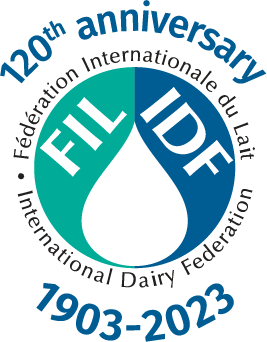
IDF organised its 3rd Nutrition and Health Symposium
The International Dairy Federation (IDF) organised on 3 May its third annual Nutrition and Health Symposium – Beyond nutrients: the health effects of whole foods. The symposium featured key presentations from world renowned experts on dairy’s impact on non-communicable diseases. Speakers explored the impact of the dairy matrix on colorectal, cancer, heart and bone health, as well as type 2 diabetes. The presentations were followed by an interactive panel discussion led by the moderators Professor. Corinna Walsh from South Africa and Dr Andrea Josse from Canada. After opening words from IDF President, Piercristiano Brazzale, and Director General, Ms. Caroline Emond, Dr Nancy Aburto, Deputy Director, Food and Nutrition Division at FAO, addressed their view on nutrition “a world where all people are eating healthy diets form efficient, inclusive, resilient, and sustainable agrifood systems”. “When it comes to what we eat, the sum of the parts can be greater than the whole”, she added. “Symposia like the one today and the evidence that will be shared, discussed, and debated are vital to help inform the work we do at FAO. We rely on robust scientific evidence like what will be shared today as an important contribution to our efforts “, she concluded. Hannah Holscher, Associate Professor of Nutrition at the University of Illinois at Urbana Champaign, focused her presentation on how food matrixes affect nutrient bioaccessibility. “A growing body of research is demonstrating plausible biological mechanisms associated with matrix-specific health effects”, she said. “The role of fermented dairy consumption on health provides evidence for the food matrix effect in dairy foods, such as bioactive peptides that contribute to anti-hypertensive effects and the presence of ß-galactosidase contributing to lactose digestion”, Professor Holscher added. The growing evidence about the relation between dairy, gut microbiota and cancer prevention was addressed by University of Bologna Associate Professor, Luigi Ricciardiello. Professor Ricciardello’s presentation particularly focused on dairy’s preventive effects on colorectal cancer: “There is strong indication that fermented milk products act through modulation of the gut microbiota, which is critical in reducing inflammation and the risk of developing colorectal cancer”, he stated. Next speaker, Emma Feeney, from University College Dublin, studied the relationship between cheese consumption and cholesterol and ultimately stroke risks: “Cheese is associated with a reduced risk of stroke, and it was slightly protective for CHD. The biggest reductions in total and LDL cholesterol are seen when people consumed fat from a whole food such as within the matrix of cheese”, she explained. Like previous years, the benefits of consuming dairy along the whole life course were also mentioned at this year’s symposium. An interesting view of the benefits of calcium and protein in adolescents and aged people were provided by University of Mebourne’s expert Dr Sandra Iuliano. “Dairy foods are an important source of calcium and protein for older adults in care homes, that reduces fractures, falls, weight loss and malnutrition risk”, she said. “Benefits are likely in other individuals with similar fracture risk and levels of calcium and protein inadequacies”, she added. Canadian expert from Laval University, Professor André Marette, analysed the “Mechanisms underlying the beneficial effects of yogurt intake on obesity, type 2 diabetes and fatty liver disease”.“There is growing literature suggesting that yogurt intake might reduce type 2 diabetes risk through its nutrient-rich profile and/or by the presence of specific compounds derived from milk fermentation”, he stated. The IDF Nutrition and Health Symposium 2023, directed at health professionals, was aired twice: at 7am and 4pm CEST, to allow nearly 400 participants from different parts of the world to attend. The recording of the sessions will be made available. A new IDF factsheet on the importance of the dairy matrix was released A new IDF factsheet on the importance of the dairy matrix in the evaluation of the nutritional quality and health effects was released on Wednesday, 3 May, during the IDF Nutrition and Health Symposium – Beyond nutrients: the health effects of whole foods. This new factsheet focuses on the association of whole foods and dietary patterns with health. “Nutrition research has traditionally focused on identifying the specific associations through which single nutrients impact health outcomes – for example, calcium and bone health, protein and skeletal muscle and, saturated fat and heart disease”, said the authors. “The approach to studying individual nutrients in relation to health has been described as a ‘reductionist’ perspective”, they added. “The focus of nutrition research has recently started to shift to examine the association of whole foods and dietary patterns with health. This includes recognizing not only that foods have numerous nutritional attributes but also that the effect of one attribute is likely dependent on the combination of nutritional components contained in the whole food and the resulting structure”, they stated. “This focus shift is also based on the fact that people consume nutrients as part of a food, and not in isolation. Moreover, foods are usually also eaten as part of a meal”, they concluded. The Factsheet can be downloaded from the publications section of IDF’s corporate website: www.fil-idf.org







